Rongguang Ye
One-for-All Pruning: A Universal Model for Customized Compression of Large Language Models
May 18, 2025Abstract:Existing pruning methods for large language models (LLMs) focus on achieving high compression rates while maintaining model performance. Although these methods have demonstrated satisfactory performance in handling a single user's compression request, their processing time increases linearly with the number of requests, making them inefficient for real-world scenarios with multiple simultaneous requests. To address this limitation, we propose a Univeral Model for Customized Compression (UniCuCo) for LLMs, which introduces a StratNet that learns to map arbitrary requests to their optimal pruning strategy. The challenge in training StratNet lies in the high computational cost of evaluating pruning strategies and the non-differentiable nature of the pruning process, which hinders gradient backpropagation for StratNet updates. To overcome these challenges, we leverage a Gaussian process to approximate the evaluation process. Since the gradient of the Gaussian process is computable, we can use it to approximate the gradient of the non-differentiable pruning process, thereby enabling StratNet updates. Experimental results show that UniCuCo is 28 times faster than baselines in processing 64 requests, while maintaining comparable accuracy to baselines.
Learning Heterogeneous Performance-Fairness Trade-offs in Federated Learning
Apr 30, 2025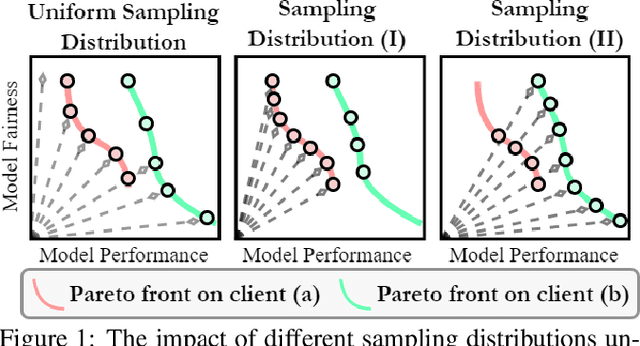
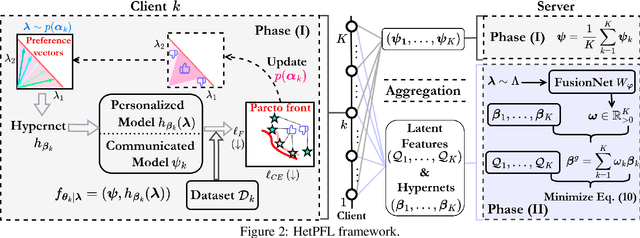
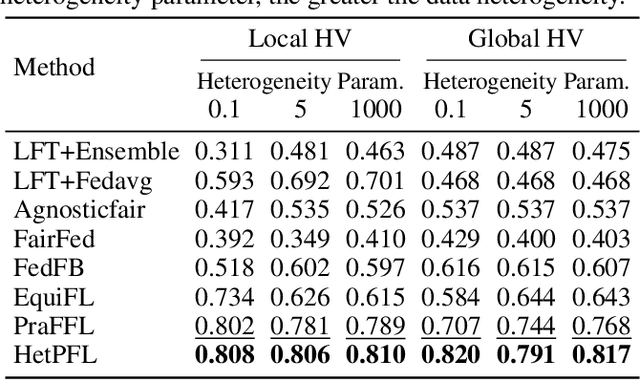
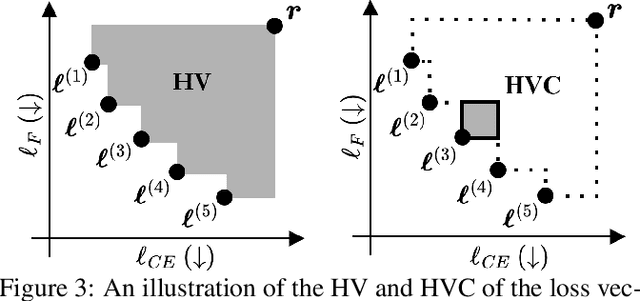
Abstract:Recent methods leverage a hypernet to handle the performance-fairness trade-offs in federated learning. This hypernet maps the clients' preferences between model performance and fairness to preference-specifc models on the trade-off curve, known as local Pareto front. However, existing methods typically adopt a uniform preference sampling distribution to train the hypernet across clients, neglecting the inherent heterogeneity of their local Pareto fronts. Meanwhile, from the perspective of generalization, they do not consider the gap between local and global Pareto fronts on the global dataset. To address these limitations, we propose HetPFL to effectively learn both local and global Pareto fronts. HetPFL comprises Preference Sampling Adaptation (PSA) and Preference-aware Hypernet Fusion (PHF). PSA adaptively determines the optimal preference sampling distribution for each client to accommodate heterogeneous local Pareto fronts. While PHF performs preference-aware fusion of clients' hypernets to ensure the performance of the global Pareto front. We prove that HetPFL converges linearly with respect to the number of rounds, under weaker assumptions than existing methods. Extensive experiments on four datasets show that HetPFL significantly outperforms seven baselines in terms of the quality of learned local and global Pareto fronts.
Label Anything: An Interpretable, High-Fidelity and Prompt-Free Annotator
Feb 05, 2025



Abstract:Learning-based street scene semantic understanding in autonomous driving (AD) has advanced significantly recently, but the performance of the AD model is heavily dependent on the quantity and quality of the annotated training data. However, traditional manual labeling involves high cost to annotate the vast amount of required data for training robust model. To mitigate this cost of manual labeling, we propose a Label Anything Model (denoted as LAM), serving as an interpretable, high-fidelity, and prompt-free data annotator. Specifically, we firstly incorporate a pretrained Vision Transformer (ViT) to extract the latent features. On top of ViT, we propose a semantic class adapter (SCA) and an optimization-oriented unrolling algorithm (OptOU), both with a quite small number of trainable parameters. SCA is proposed to fuse ViT-extracted features to consolidate the basis of the subsequent automatic annotation. OptOU consists of multiple cascading layers and each layer contains an optimization formulation to align its output with the ground truth as closely as possible, though which OptOU acts as being interpretable rather than learning-based blackbox nature. In addition, training SCA and OptOU requires only a single pre-annotated RGB seed image, owing to their small volume of learnable parameters. Extensive experiments clearly demonstrate that the proposed LAM can generate high-fidelity annotations (almost 100% in mIoU) for multiple real-world datasets (i.e., Camvid, Cityscapes, and Apolloscapes) and CARLA simulation dataset.
Enhancing Large Vision Model in Street Scene Semantic Understanding through Leveraging Posterior Optimization Trajectory
Jan 03, 2025Abstract:To improve the generalization of the autonomous driving (AD) perception model, vehicles need to update the model over time based on the continuously collected data. As time progresses, the amount of data fitted by the AD model expands, which helps to improve the AD model generalization substantially. However, such ever-expanding data is a double-edged sword for the AD model. Specifically, as the fitted data volume grows to exceed the the AD model's fitting capacities, the AD model is prone to under-fitting. To address this issue, we propose to use a pretrained Large Vision Models (LVMs) as backbone coupled with downstream perception head to understand AD semantic information. This design can not only surmount the aforementioned under-fitting problem due to LVMs' powerful fitting capabilities, but also enhance the perception generalization thanks to LVMs' vast and diverse training data. On the other hand, to mitigate vehicles' computational burden of training the perception head while running LVM backbone, we introduce a Posterior Optimization Trajectory (POT)-Guided optimization scheme (POTGui) to accelerate the convergence. Concretely, we propose a POT Generator (POTGen) to generate posterior (future) optimization direction in advance to guide the current optimization iteration, through which the model can generally converge within 10 epochs. Extensive experiments demonstrate that the proposed method improves the performance by over 66.48\% and converges faster over 6 times, compared to the existing state-of-the-art approach.
Fast-Convergent and Communication-Alleviated Heterogeneous Hierarchical Federated Learning in Autonomous Driving
Sep 29, 2024Abstract:Street Scene Semantic Understanding (denoted as TriSU) is a complex task for autonomous driving (AD). However, inference model trained from data in a particular geographical region faces poor generalization when applied in other regions due to inter-city data domain-shift. Hierarchical Federated Learning (HFL) offers a potential solution for improving TriSU model generalization by collaborative privacy-preserving training over distributed datasets from different cities. Unfortunately, it suffers from slow convergence because data from different cities are with disparate statistical properties. Going beyond existing HFL methods, we propose a Gaussian heterogeneous HFL algorithm (FedGau) to address inter-city data heterogeneity so that convergence can be accelerated. In the proposed FedGau algorithm, both single RGB image and RGB dataset are modelled as Gaussian distributions for aggregation weight design. This approach not only differentiates each RGB image by respective statistical distribution, but also exploits the statistics of dataset from each city in addition to the conventionally considered data volume. With the proposed approach, the convergence is accelerated by 35.5\%-40.6\% compared to existing state-of-the-art (SOTA) HFL methods. On the other hand, to reduce the involved communication resource, we further introduce a novel performance-aware adaptive resource scheduling (AdapRS) policy. Unlike the traditional static resource scheduling policy that exchanges a fixed number of models between two adjacent aggregations, AdapRS adjusts the number of model aggregation at different levels of HFL so that unnecessary communications are minimized. Extensive experiments demonstrate that AdapRS saves 29.65\% communication overhead compared to conventional static resource scheduling policy while maintaining almost the same performance.
Pareto Front Shape-Agnostic Pareto Set Learning in Multi-Objective Optimization
Aug 11, 2024Abstract:Pareto set learning (PSL) is an emerging approach for acquiring the complete Pareto set of a multi-objective optimization problem. Existing methods primarily rely on the mapping of preference vectors in the objective space to Pareto optimal solutions in the decision space. However, the sampling of preference vectors theoretically requires prior knowledge of the Pareto front shape to ensure high performance of the PSL methods. Designing a sampling strategy of preference vectors is difficult since the Pareto front shape cannot be known in advance. To make Pareto set learning work effectively in any Pareto front shape, we propose a Pareto front shape-agnostic Pareto Set Learning (GPSL) that does not require the prior information about the Pareto front. The fundamental concept behind GPSL is to treat the learning of the Pareto set as a distribution transformation problem. Specifically, GPSL can transform an arbitrary distribution into the Pareto set distribution. We demonstrate that training a neural network by maximizing hypervolume enables the process of distribution transformation. Our proposed method can handle any shape of the Pareto front and learn the Pareto set without requiring prior knowledge. Experimental results show the high performance of our proposed method on diverse test problems compared with recent Pareto set learning algorithms.
* 7 pages
pFedLVM: A Large Vision Model -Driven and Latent Feature-Based Personalized Federated Learning Framework in Autonomous Driving
May 07, 2024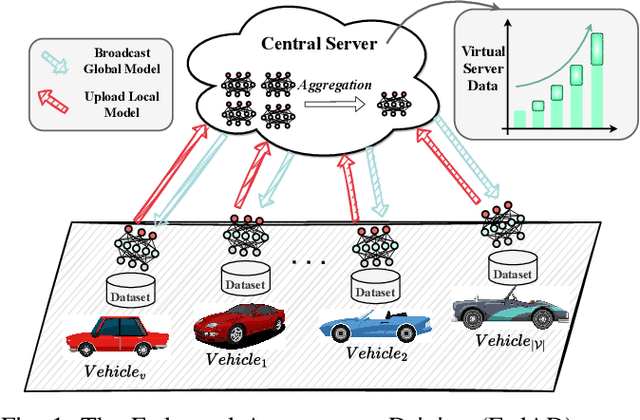
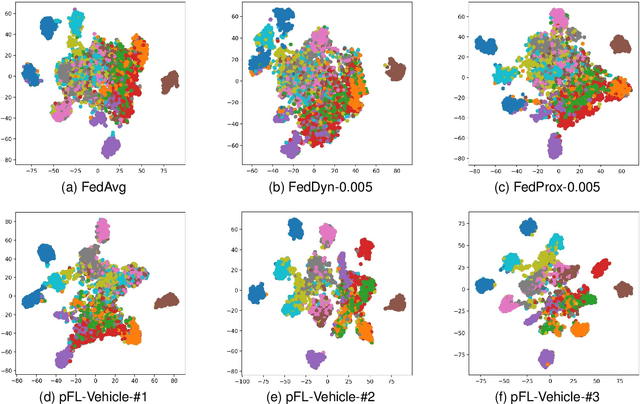
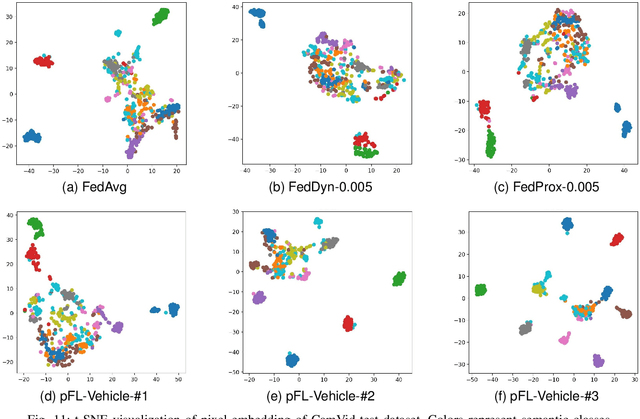

Abstract:Deep learning-based Autonomous Driving (AD) models often exhibit poor generalization due to data heterogeneity in an ever domain-shifting environment. While Federated Learning (FL) could improve the generalization of an AD model (known as FedAD system), conventional models often struggle with under-fitting as the amount of accumulated training data progressively increases. To address this issue, instead of conventional small models, employing Large Vision Models (LVMs) in FedAD is a viable option for better learning of representations from a vast volume of data. However, implementing LVMs in FedAD introduces three challenges: (I) the extremely high communication overheads associated with transmitting LVMs between participating vehicles and a central server; (II) lack of computing resource to deploy LVMs on each vehicle; (III) the performance drop due to LVM focusing on shared features but overlooking local vehicle characteristics. To overcome these challenges, we propose pFedLVM, a LVM-Driven, Latent Feature-Based Personalized Federated Learning framework. In this approach, the LVM is deployed only on central server, which effectively alleviates the computational burden on individual vehicles. Furthermore, the exchange between central server and vehicles are the learned features rather than the LVM parameters, which significantly reduces communication overhead. In addition, we utilize both shared features from all participating vehicles and individual characteristics from each vehicle to establish a personalized learning mechanism. This enables each vehicle's model to learn features from others while preserving its personalized characteristics, thereby outperforming globally shared models trained in general FL. Extensive experiments demonstrate that pFedLVM outperforms the existing state-of-the-art approaches.
PraFFL: A Preference-Aware Scheme in Fair Federated Learning
Apr 13, 2024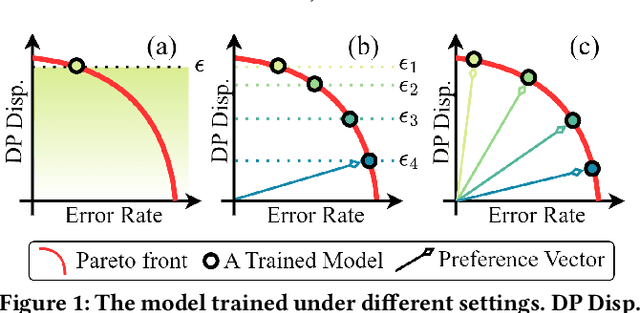
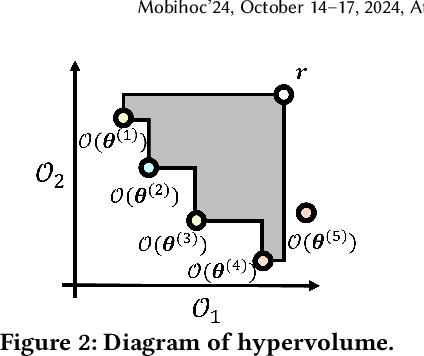
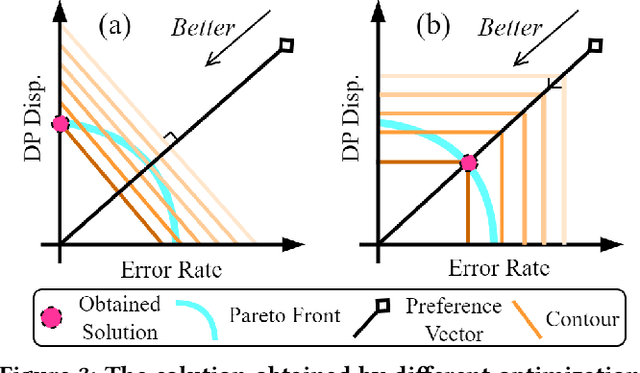
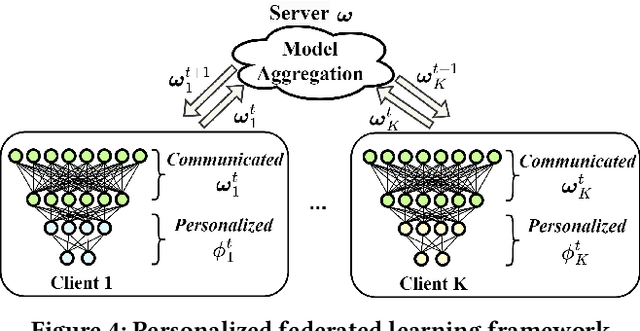
Abstract:Fairness in federated learning has emerged as a critical concern, aiming to develop an unbiased model for any special group (e.g., male or female) of sensitive features. However, there is a trade-off between model performance and fairness, i.e., improving fairness will decrease model performance. Existing approaches have characterized such a trade-off by introducing hyperparameters to quantify client's preferences for fairness and model performance. Nevertheless, these methods are limited to scenarios where each client has only a single pre-defined preference. In practical systems, each client may simultaneously have multiple preferences for the model performance and fairness. The key challenge is to design a method that allows the model to adapt to diverse preferences of each client in real time. To this end, we propose a Preference-aware scheme in Fair Federated Learning paradigm (called PraFFL). PraFFL can adaptively adjust the model based on each client's preferences to meet their needs. We theoretically prove that PraFFL can provide the optimal model for client's arbitrary preferences. Experimental results show that our proposed PraFFL outperforms five existing fair federated learning algorithms in terms of the model's capability in adapting to clients' different preferences.
Evolutionary Preference Sampling for Pareto Set Learning
Apr 12, 2024Abstract:Recently, Pareto Set Learning (PSL) has been proposed for learning the entire Pareto set using a neural network. PSL employs preference vectors to scalarize multiple objectives, facilitating the learning of mappings from preference vectors to specific Pareto optimal solutions. Previous PSL methods have shown their effectiveness in solving artificial multi-objective optimization problems (MOPs) with uniform preference vector sampling. The quality of the learned Pareto set is influenced by the sampling strategy of the preference vector, and the sampling of the preference vector needs to be decided based on the Pareto front shape. However, a fixed preference sampling strategy cannot simultaneously adapt the Pareto front of multiple MOPs. To address this limitation, this paper proposes an Evolutionary Preference Sampling (EPS) strategy to efficiently sample preference vectors. Inspired by evolutionary algorithms, we consider preference sampling as an evolutionary process to generate preference vectors for neural network training. We integrate the EPS strategy into five advanced PSL methods. Extensive experiments demonstrate that our proposed method has a faster convergence speed than baseline algorithms on 7 testing problems. Our implementation is available at https://github.com/rG223/EPS.
Data-Driven Preference Sampling for Pareto Front Learning
Apr 12, 2024Abstract:Pareto front learning is a technique that introduces preference vectors in a neural network to approximate the Pareto front. Previous Pareto front learning methods have demonstrated high performance in approximating simple Pareto fronts. These methods often sample preference vectors from a fixed Dirichlet distribution. However, no fixed sampling distribution can be adapted to diverse Pareto fronts. Efficiently sampling preference vectors and accurately estimating the Pareto front is a challenge. To address this challenge, we propose a data-driven preference vector sampling framework for Pareto front learning. We utilize the posterior information of the objective functions to adjust the parameters of the sampling distribution flexibly. In this manner, the proposed method can sample preference vectors from the location of the Pareto front with a high probability. Moreover, we design the distribution of the preference vector as a mixture of Dirichlet distributions to improve the performance of the model in disconnected Pareto fronts. Extensive experiments validate the superiority of the proposed method compared with state-of-the-art algorithms.
 Add to Chrome
Add to Chrome Add to Firefox
Add to Firefox Add to Edge
Add to Edge